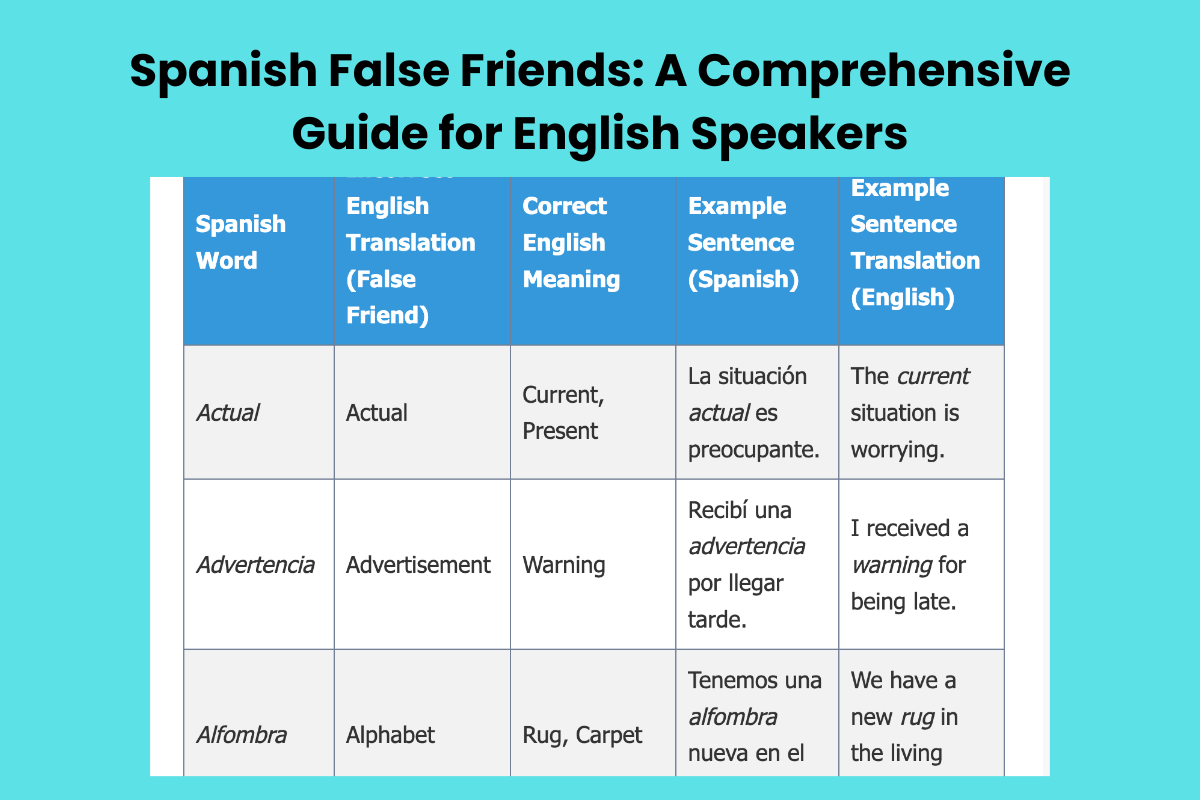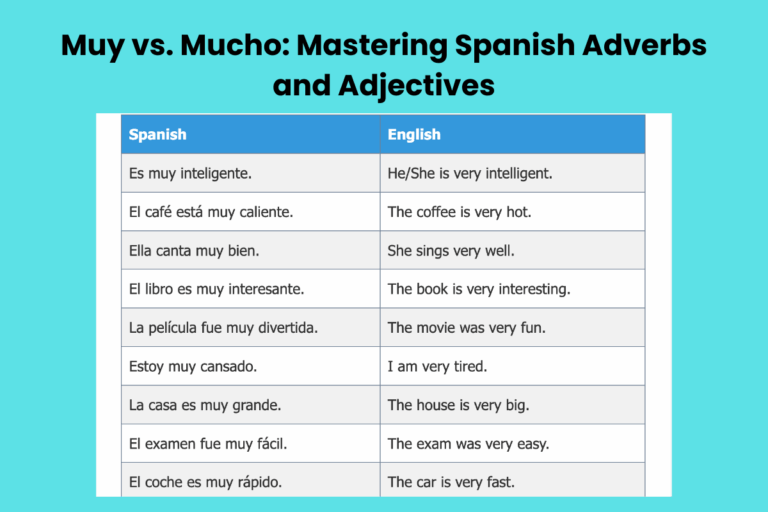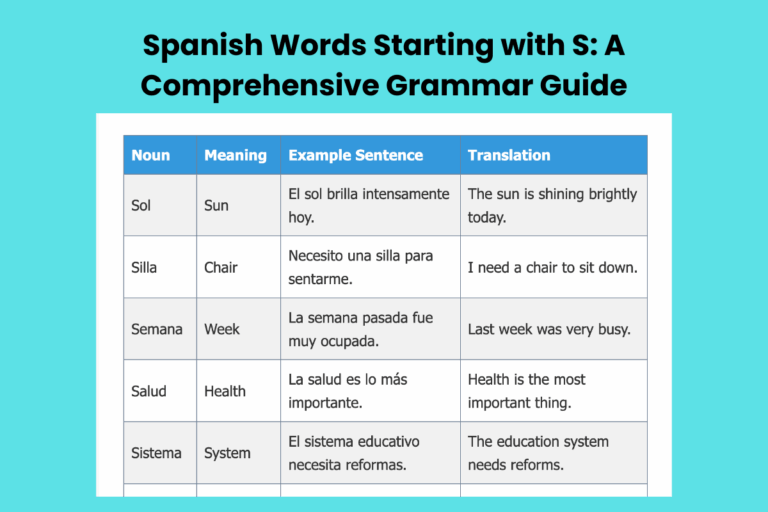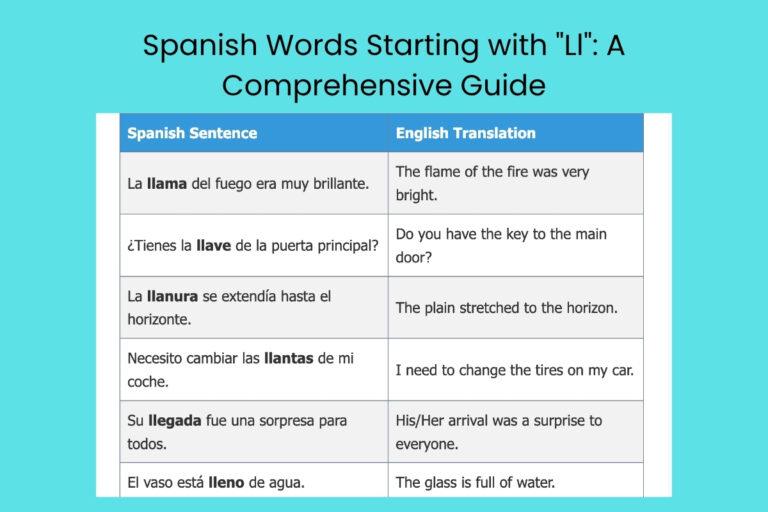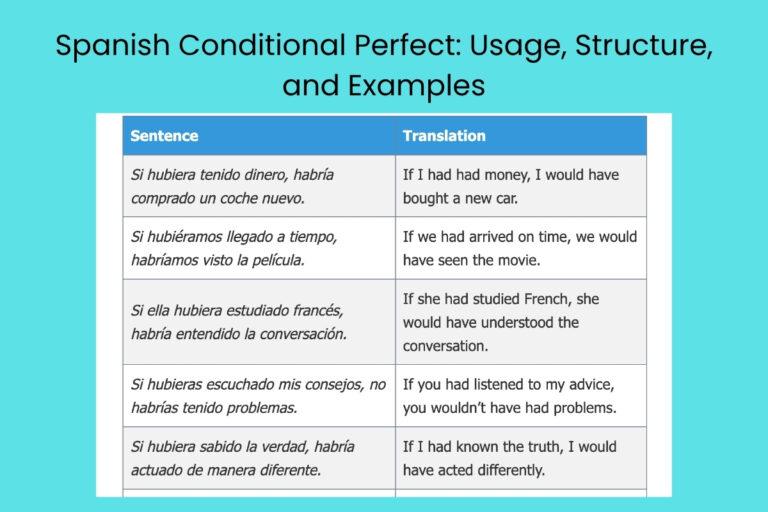Spanish False Friends: A Comprehensive Guide for English Speakers
Navigating a new language can be tricky, and Spanish is no exception. While the similarities between Spanish and English can be helpful due to shared Latin roots, they also present a unique challenge: false friends, also known as false cognates.
These words look or sound similar in both languages but have completely different meanings, leading to potential misunderstandings and humorous, albeit embarrassing, situations. Understanding these linguistic pitfalls is crucial for effective communication and avoiding common errors.
This guide is designed to equip you with the knowledge and tools to identify and correctly use Spanish false friends, enhancing your fluency and confidence in the language.
Table of Contents
- Introduction
- Definition of Spanish False Friends
- Structural Breakdown and Linguistic Origins
- Types and Categories of False Friends
- Examples of Common Spanish False Friends
- Usage Rules and Contextual Considerations
- Common Mistakes with False Friends
- Practice Exercises
- Advanced Topics: Regional Variations and Nuances
- Frequently Asked Questions
- Conclusion
Introduction
Learning Spanish as an English speaker comes with its own set of rewards and challenges. One of the most interesting, and potentially frustrating, aspects is the existence of false friends. These words, also known as false cognates, share a similar spelling or pronunciation in Spanish and English but carry entirely different meanings. Misunderstanding these words can lead to miscommunication, confusion, and even amusement. This comprehensive guide aims to provide a clear understanding of Spanish false friends, offering examples, usage rules, and practice exercises to help you navigate these linguistic pitfalls with confidence.
Definition of Spanish False Friends
False friends, or false cognates, are words that appear similar in two languages but have different meanings. In the context of Spanish and English, these words often share Latin roots, contributing to their resemblance. However, their meanings have diverged over time due to separate linguistic evolutions. Recognizing and understanding these differences is essential for accurate communication in Spanish.
False friends can be categorized based on the degree of similarity in spelling and pronunciation, as well as the extent of the difference in meaning. Some false friends are nearly identical in spelling but have drastically different meanings, while others may share only a partial resemblance.
The key is to avoid assuming that a word’s meaning is the same across both languages simply because of its appearance.
Classification of False Friends
False friends can be broadly classified into two categories: total false friends and partial false friends.
- Total False Friends: These words have completely different meanings in Spanish and English. Using the English meaning in a Spanish context would be incorrect and potentially confusing.
- Partial False Friends: These words share one or more meanings in common but also have distinct meanings that differ between the two languages. It’s crucial to understand the specific context to determine the correct meaning.
Function of Understanding False Friends
Understanding false friends serves several key functions in language learning:
- Preventing Miscommunication: Avoiding the use of an incorrect meaning for a false friend prevents misunderstandings in conversations and written communication.
- Improving Fluency: Accurate use of vocabulary enhances fluency and confidence in speaking and writing Spanish.
- Enhancing Comprehension: Recognizing false friends improves comprehension of spoken and written Spanish, allowing for a more accurate interpretation of the intended message.
- Avoiding Embarrassment: Using words correctly helps avoid potentially embarrassing situations that can arise from miscommunication.
Contexts Where False Friends Are Problematic
False friends can be particularly problematic in various contexts:
- Everyday Conversations: Simple, everyday conversations can be disrupted by misunderstandings caused by false friends.
- Formal Writing: In academic or professional writing, using false friends can lead to inaccuracies and a lack of credibility.
- Business Communication: Misinterpreting false friends in business settings can have serious consequences, affecting negotiations and agreements.
- Travel: While traveling, misunderstanding false friends can lead to confusion and difficulties in navigating new environments.
Structural Breakdown and Linguistic Origins
The existence of false friends is often rooted in the shared linguistic history of Spanish and English. Both languages have been influenced by Latin, leading to the presence of cognates – words with a common origin.
However, over centuries of separate evolution, the meanings of some cognates have diverged, resulting in false friends.
Understanding the etymology of these words can sometimes shed light on the reasons for the divergence in meaning. For example, a word might have retained its original Latin meaning in one language while evolving to take on a different meaning in the other.
Analyzing the structural elements of false friends, such as prefixes, suffixes, and root words, can also be helpful in distinguishing their meanings. Recognizing common patterns and variations can aid in identifying and correctly using these words.
Types and Categories of False Friends
Spanish false friends can be categorized based on several factors, including the degree of similarity in spelling and pronunciation, the extent of the difference in meaning, and the specific contexts in which they are commonly misused. By understanding these categories, learners can develop a more nuanced awareness of the potential pitfalls and improve their accuracy in using Spanish vocabulary.
Based on Similarity in Spelling
Some false friends have very similar spellings, making them particularly deceptive. These words often share the same root but have evolved differently in each language.
Based on Similarity in Pronunciation
Other false friends sound similar but have different spellings. These words can be tricky because the auditory similarity can lead to assumptions about their meaning.
Based on Degree of Difference in Meaning
False friends can also be categorized based on how different their meanings are. Some have completely unrelated meanings, while others share a partial overlap.
Based on Context of Common Misuse
Certain false friends are frequently misused in specific contexts, such as travel, business, or everyday conversations. Recognizing these common errors can help learners avoid making the same mistakes.
Examples of Common Spanish False Friends
This section provides a comprehensive list of common Spanish false friends, along with their correct meanings in both languages. Understanding these examples is crucial for avoiding miscommunication and improving your Spanish fluency.
The following tables will present Spanish false friends, their English translations, and the actual meaning of the Spanish word. This should help you avoid common pitfalls.
Table 1: Common Spanish False Friends (A-C)
This table highlights some of the most common false friends, starting with the letters A through C. Pay close attention to the differences in meaning to avoid mistakes.
| Spanish Word | Incorrect English Translation (False Friend) | Correct English Meaning | Example Sentence (Spanish) | Example Sentence Translation (English) |
|---|---|---|---|---|
| Actual | Actual | Current, Present | La situación actual es preocupante. | The current situation is worrying. |
| Advertencia | Advertisement | Warning | Recibí una advertencia por llegar tarde. | I received a warning for being late. |
| Alfombra | Alphabet | Rug, Carpet | Tenemos una alfombra nueva en el salón. | We have a new rug in the living room. |
| Apegarse | To appeal | To become fond of, to get attached to | Me apegué mucho a mi mascota. | I became very fond of my pet. |
| Asistir | Assist | To attend | Debo asistir a la reunión mañana. | I must attend the meeting tomorrow. |
| Atender | Attend | To pay attention to, to take care of | Por favor, atiende a lo que digo. | Please, pay attention to what I’m saying. |
| Bizarro | Bizarre | Brave, Gallant | El caballero fue muy bizarro. | The knight was very brave. |
| Blanco | Blank | White | La pared es de color blanco. | The wall is white. |
| Cama | Calm | Bed | Voy a la cama, estoy cansado. | I’m going to bed, I’m tired. |
| Campo | Camp | Countryside, Field | Me encanta el campo en primavera. | I love the countryside in spring. |
| Carta | Charter | Letter, Menu | Escribí una carta a mi abuela. | I wrote a letter to my grandmother. |
| Casualidad | Casualty | Coincidence, Chance | Fue una casualidad encontrarnos aquí. | It was a coincidence to meet here. |
| Colegio | College | School (primary or secondary) | Mi hijo va al colegio todos los días. | My son goes to school every day. |
| Compromiso | Compromise | Commitment, Engagement | Tengo un compromiso esta noche. | I have a commitment tonight. |
| Conductor | Conductor | Driver | El conductor del autobús es muy amable. | The driver of the bus is very kind. |
| Constipado | Constipated | Having a cold | Estoy constipado, necesito un pañuelo. | I have a cold, I need a tissue. |
| Copa | Cop | Glass, Cup | Quiero una copa de vino. | I want a glass of wine. |
| Cuello | College | Neck | Me duele el cuello. | My neck hurts. |
| Cuestión | Question | Matter, Issue | Es una cuestión de tiempo. | It’s a matter of time. |
Table 2: Common Spanish False Friends (D-L)
This table continues with false friends from D through L, offering more examples to expand your vocabulary and awareness.
| Spanish Word | Incorrect English Translation (False Friend) | Correct English Meaning | Example Sentence (Spanish) | Example Sentence Translation (English) |
|---|---|---|---|---|
| Decepción | Deception | Disappointment | Fue una gran decepción perder el partido. | It was a big disappointment to lose the game. |
| Delito | Delight | Crime, Offense | Cometió un delito grave. | He committed a serious crime. |
| Desgracia | Disgrace | Misfortune, Tragedy | Fue una gran desgracia el accidente. | The accident was a great misfortune. |
| Discutir | Discuss | To argue | No quiero discutir contigo. | I don’t want to argue with you. |
| Divorcio | Divorce | Divorce | El divorcio fue amistoso. | The divorce was amicable. |
| Embarazada | Embarrassed | Pregnant | Ella está embarazada de seis meses. | She is six months pregnant. |
| Éxito | Exit | Success | Le deseo mucho éxito en su nuevo trabajo. | I wish him much success in his new job. |
| Fábrica | Fabric | Factory | Trabajo en una fábrica de coches. | I work in a car factory. |
| Fastidioso | Fastidious | Annoying, Irritating | Este ruido es muy fastidioso. | This noise is very annoying. |
| Figura | Figure | Shape, Character | Reconozco esa figura. | I recognize that shape. |
| Firma | Firm | Signature | Necesito tu firma aquí. | I need your signature here. |
| Formal | Formal | Serious | Es un asunto formal. | It’s a serious matter. |
| Gracioso | Gracious | Funny | El payaso es muy gracioso. | The clown is very funny. |
| Grosería | Grocery | Rude remark, Insult | Eso fue una grosería. | That was a rude remark. |
| Idioma | Idiom | Language | El español es un idioma hermoso. | Spanish is a beautiful language. |
| Ignorar | Ignore | To not know | Ignoro la respuesta a esa pregunta. | I don’t know the answer to that question. |
| Introducir | Introduce | To insert | Necesito introducir la llave en la cerradura. | I need to insert the key into the lock. |
| Largo | Large | Long | El río es muy largo. | The river is very long. |
| Lectura | Lecture | Reading | La lectura es mi pasatiempo favorito. | Reading is my favorite hobby. |
| Librería | Library | Bookstore | Compré un libro en la librería. | I bought a book at the bookstore. |
Table 3: Common Spanish False Friends (M-Z)
This table completes the list of common false friends, covering the letters M through Z. Continue practicing to solidify your understanding.
| Spanish Word | Incorrect English Translation (False Friend) | Correct English Meaning | Example Sentence (Spanish) | Example Sentence Translation (English) |
|---|---|---|---|---|
| Manera | Manner | Way | No me gusta su manera de hablar. | I don’t like his way of speaking. |
| Masa | Mass | Dough | Preparamos la masa para la pizza. | We prepared the dough for the pizza. |
| Molestar | Molest | To bother, to annoy | No me molestes, estoy ocupado. | Don’t bother me, I’m busy. |
| Noticia | Notice | News | Tengo una buena noticia para ti. | I have good news for you. |
| Oficina | Office | Office | Trabajo en una oficina cerca de mi casa. | I work in an office near my house. |
| Olla | Oil | Pot | Puse la sopa en la olla. | I put the soup in the pot. |
| Ordinario | Ordinary | Common, Vulgar | Es una persona ordinaria. | He is a common person. |
| Padres | Padre | Parents | Mis padres me visitarán pronto. | My parents will visit me soon. |
| Parientes | Parents | Relatives | Tengo muchos parientes en España. | I have many relatives in Spain. |
| Pasta | Paste | Pasta | Me encanta la pasta italiana. | I love Italian pasta. |
| Pie | Pie | Foot | Me duele el pie. | My foot hurts. |
| Plantar | Plant | To plant | Vamos a plantar árboles en el jardín. | We are going to plant trees in the garden. |
| Pronto | Prong | Soon | Volveré pronto. | I will be back soon. |
| Pupilo | Pupil | Boarder, Ward | Es un pupilo en esta escuela. | He is a boarder at this school. |
| Realizar | Realize | To accomplish, to carry out | Vamos a realizar el proyecto. | We are going to carry out the project. |
| Recordar | Record | To remember | Debo recordar comprar leche. | I must remember to buy milk. |
| Ropa | Rope | Clothes | Necesito comprar ropa nueva. | I need to buy new clothes. |
| Salario | Salary | Wage | Mi salario es muy bueno. | My wage is very good. |
| Sano | Sane | Healthy | Es importante llevar una vida sana. | It is important to lead a healthy life. |
| Sensible | Sensible | Sensitive | Es una persona muy sensible. | She is a very sensitive person. |
| Sopa | Soap | Soup | Me gusta la sopa de tomate. | I like tomato soup. |
| Suceso | Success | Event, Incident | Hubo un suceso extraño ayer. | There was a strange incident yesterday. |
| Sujeto | Subject | Person | El sujeto era sospechoso. | The person was suspicious. |
| Ultimamente | Ultimately | Lately, Recently | Ultimamente he estado muy ocupado. | Lately I have been very busy. |
Usage Rules and Contextual Considerations
Understanding the usage rules for Spanish false friends is crucial for accurate communication. These rules often depend on the specific context in which the word is used.
Pay attention to the surrounding words and phrases to determine the correct meaning.
In some cases, a false friend may have multiple meanings in Spanish, only one of which corresponds to the English meaning. It’s important to be aware of all possible meanings and choose the appropriate one based on the context.
Furthermore, regional variations can also affect the usage of false friends. A word that is commonly used in one Spanish-speaking country may have a different meaning or connotation in another.
Contextual Examples
Let’s examine some examples to illustrate how context affects the meaning of false friends:
- Actual: While it looks like “actual,” it means “current.” For example, “La situación actual es difícil” means “The current situation is difficult.”
- Asistir: Instead of “assist,” it means “to attend.” For example, “Voy a asistir a la conferencia” means “I am going to attend the conference.”
- Embarazada: This doesn’t mean “embarrassed”; it means “pregnant.” For example, “Ella está embarazada” means “She is pregnant.”
Exceptions and Special Cases
Some false friends have exceptions or special cases that require extra attention. For example, certain words may have a similar meaning in specific technical or specialized contexts.
It’s also important to be aware of idiomatic expressions that include false friends. These expressions often have a figurative meaning that differs from the literal meaning of the individual words.
Common Mistakes with False Friends
This section highlights common mistakes that learners make when using Spanish false friends. By recognizing these errors, you can avoid making them yourself and improve your accuracy in Spanish.
The most common mistake is assuming that a word’s meaning is the same in both languages simply because of its appearance or pronunciation. This can lead to miscommunication and confusion.
Another common mistake is failing to consider the context in which the word is used. As mentioned earlier, the context is crucial for determining the correct meaning of a false friend.
Correct vs. Incorrect Examples
Let’s examine some examples of correct and incorrect usage of false friends:
| Spanish Sentence | Incorrect English Translation | Correct English Translation |
|---|---|---|
| Estoy constipado. | I am constipated. | I have a cold. |
| Voy a asistir a la fiesta. | I am going to assist the party. | I am going to attend the party. |
| Ella está embarazada. | She is embarrassed. | She is pregnant. |
| Quiero una copa de vino. | I want a cop of wine. | I want a glass of wine. |
| Es una cuestión importante. | It’s a question important. | It’s an important matter. |
Practice Exercises
These practice exercises will help you test your knowledge of Spanish false friends and improve your ability to use them correctly. Each exercise includes a set of questions with answers provided at the end.
Exercise 1: Multiple Choice
Choose the correct English translation for the following Spanish sentences.
-
Estoy constipado.
- I am constipated.
- I have a cold.
- I am congested.
-
Voy a asistir a la reunión.
- I am going to assist the meeting.
- I am going to attend the meeting.
- I am going to help the meeting.
-
Ella está embarazada.
- She is embarrassed.
- She is pregnant.
- She is burdened.
-
Quiero una copa de vino.
- I want a cop of wine.
- I want a cup of wine.
- I want a glass of wine.
-
Es una cuestión importante.
- It’s a question important.
- It’s a matter important.
- It’s an issue important.
-
La situación actual es preocupante.
- The actual situation is worrying.
- The current situation is worrying.
- The real situation is worrying.
-
Recibí una advertencia.
- I received an advertisement.
- I received a warning.
- I received an advice.
-
Tenemos una alfombra nueva.
- We have a new alphabet.
- We have a new rug.
- We have a new carpet.
-
El caballero fue muy bizarro.
- The knight was very bizarre.
- The knight was very brave.
- The knight was very strange.
-
Mi hijo va al colegio.
- My son goes to college.
- My son goes to school.
- My son goes to university.
Answers: 1. b, 2. b, 3. b, 4. c, 5. b, 6. b, 7. b, 8. b, 9. b, 10. b
Exercise 2: Fill in the Blanks
Fill in the blanks with the correct Spanish word from the list below. (constipado, asistir, embarazada, copa, cuestión)
- Estoy __________, necesito un pañuelo.
- Voy a ___________ a la conferencia.
- Ella está __________ de seis meses.
- Quiero una _________ de vino.
- Es una ___________ de tiempo.
Answers: 1. constipado, 2. asistir, 3. embarazada, 4. copa, 5. cuestión
Exercise 3: True or False
Determine whether the following statements are true or false.
- Actual means “actual.” (True/False)
- Asistir means “to assist.” (True/False)
- Embarazada means “embarrassed.” (True/False)
- Copa means “glass.” (True/False)
- Cuestión means “question.” (True/False)
Answers: 1. False, 2. False, 3. False, 4. True, 5. False
Advanced Topics: Regional Variations and Nuances
For advanced learners, it’s important to be aware of regional variations in the usage of Spanish false friends. A word that is commonly used in one Spanish-speaking country may have a different meaning or connotation in another.
Furthermore, some false friends have subtle nuances that can only be understood through extensive exposure to the language and culture. These nuances often involve idiomatic expressions, slang terms, and cultural references.
Mastering these advanced topics requires a deep understanding of the Spanish language and culture, as well as a willingness to continue learning and refining your knowledge.
Frequently Asked Questions
- What are Spanish false friends?
Spanish false friends, also known as false cognates, are words that look or sound similar to English words but have different meanings. These words can lead to confusion and miscommunication if not understood correctly. They often share Latin roots but have evolved differently over time.
- Why are false friends a problem?
False friends are problematic because they can lead to misunderstandings and incorrect usage of vocabulary. Assuming that a word has the same meaning in both languages simply because of its appearance can result in miscommunication in conversations, writing, and other forms of communication. This can lead to embarrassing situations and inaccurate interpretations of information.
- How can I identify Spanish false friends?
You can identify Spanish false friends by paying close attention to the context in which the word is used. If the meaning doesn’t seem to fit the context, it’s possible that you’re dealing with a false friend. Consulting a dictionary or language resource that specifically lists false friends can also be helpful. Remember that if a word seems too good to be true (i.e., exactly like an English word), it probably is!
- What are some common Spanish false friends?
Some common Spanish false friends include actual (meaning “current”), asistir (meaning “to attend”), embarazada (meaning “pregnant”), constipado (meaning “having a cold”), and librería (meaning “bookstore”). Being aware of these and other common false friends is crucial for avoiding miscommunication.
- How can I avoid making mistakes with false friends?
To avoid making mistakes with false friends, make a conscious effort to learn the correct meanings of these words. Use flashcards, create vocabulary lists, and practice using the words in context. Pay attention to the context in which the word is used and double-check the meaning if you’re unsure. Don’t assume that a word has the same meaning in both languages simply because of its appearance.
- Are there regional variations
in the usage of false friends?
Yes, there can be regional variations in the usage of Spanish false friends. A word that is commonly used in one Spanish-speaking country may have a different meaning or connotation in another. It’s important to be aware of these regional differences and to adapt your vocabulary accordingly when communicating with people from different regions.
- Where can I find a comprehensive list of Spanish false friends?
You can find comprehensive lists of Spanish false friends in various language resources, such as dictionaries, textbooks, and online websites. Many websites and apps are specifically dedicated to helping learners identify and understand false friends. Look for resources that provide clear definitions, examples, and usage rules for each word.
- How important is it to learn about false friends?
Learning about false friends is very important for achieving fluency and accuracy in Spanish. Misunderstanding these words can lead to miscommunication, confusion, and even embarrassment. By taking the time to learn about false friends and practice using them correctly, you can significantly improve your Spanish language skills and communicate more effectively.
Conclusion
Spanish false friends present a unique challenge for English speakers learning the language. While the similarities between Spanish and English can be helpful, they can also be deceptive.
By understanding the definition, types, and usage rules of false friends, you can avoid common mistakes and improve your accuracy in Spanish.
This guide has provided a comprehensive overview of Spanish false friends, including examples, practice exercises, and advanced topics. By continuing to study and practice, you can master these linguistic pitfalls and communicate with confidence in Spanish.

